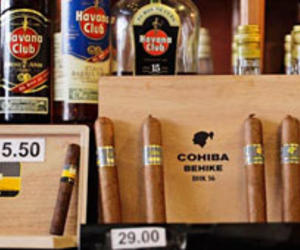Chinese come to their Cuban comrades' rescue by lighting up cigars
- Submitted by: manso
- Editorial Articles
- 02 / 23 / 2011

Rising wealth and socialist solidarity sees China become major market for Cuban export hit by smoking bans and recession. Tuesday 22 February 2011 14.51 GMT. Cuban Cohiba Cuban cigar sales rose in 2010 as enthusiastic Chinese smokers helped to counter the effects global recession and smoking bans.
Winston Churchill and Fidel Castro fed the mystique, but it is Chinese smokers who could ultimately save the Cuban cigar.Demand from China's expanding economic elite has sparked optimism in an industry that risked being extinguished by recession and anti-smoking laws around the world.
Cuban cigar sales rose 2% last year, according to the latest figures, reversing a downward trend. This is thanks to a jump in Asian sales as China overtook Germany as the third largest market for Habanos SA, the worldwide distributor of Cuban cigars. The distributor generated £228m in worldwide sales, a slight increase on the previous year rather than the much-anticipated drop, given bans in Europe and elsewhere on smoking in bars, restaurants and public spaces.
Spain and France remain the biggest markets, but following the opening of Cuban cigar shops in Beijing, Guangzhou, Shenzhen and Shanghai, China is catching up. Brands such as Montecristo, Cohiba and Patargás offer an image of luxury and sophistication, qualities sought by China's burgeoning middle class.
These days, venues such as Havana Nirvana in Shanghai and Cohiba Atmosphere in Beijing allow the moneyed elite to relax with an expensive import and store prized purchases in rented humidors, ensuring their cigars remain in top condition.
But some Chinese aficionados have been enjoying Cuban tobacco since before the current boom. When William Wang sampled his very first cigar, eight years ago, the domestic sector barely existed. He can still recall the aroma of the Davidoff he savoured in a Shanghai wine bar.
"My friends were all smoking cigars so I tried one too. It smelt really good and I felt very relaxed afterwards. So I kept on smoking them," he said.
Marketing manager for Casa de Tobaco, which arranges cigar-related events, Wang added: "In China, the people who smoke cigars are the upper class, the elite, or people who have come back from overseas.
"After people [who smoke] get rich, they want something nicer, something more upscale, something different. A cigar becomes their best choice. And in China, the number of people who become very rich is getting bigger and bigger."
China is already the world's largest market for tobacco, with growing health concerns having little impact on the enormous demand. But of the roughly one in two Chinese men who smoke, the vast majority choose cigarettes.
A 2008 report said the Chinese cigar market was worth around 2.2bn yuan — but 200m of the 370m cigars sold that year were poor quality domestic products sold at rockbottom prices.
Industry sources say the market for imports is growing by around 30% a year or more."Foreigners were the first smokers in China, then gift-senders began buying Cuban cigars for people they wanted to please, and later people started to smoke themselves," said KC Chan, manager of Hong Kong-based Infifon, Habanos SA's distributor to the mainland.
"Initially it was a form of showing off or conspicuous consumption. Now real consumption is kicking in, but there's a long way to go."
He added: "Cuban cigars are almost exclusively the prestige cigar that everyone is after.
"Firstly, people know the cigars are the best. Secondly, it's a symbol of luxury. And thirdly, because Cuba is a socialist country, Chinese people have more of a sense of closeness. It's easier for Chinese people to accept that it is from another socialist country. It raises their curiosity."
This is welcome news for an industry shrouded in gloom when Habanos SA, a joint venture between Cuba and Imperial Tobacco Group, blamed an 8% fall in overseas sales last year on recession and bans.
The figures were released by its marketing director, Ana Lopez, at a news conference opening its annual cigar festival.
The company hopes smaller cigars, which are quicker to smoke, will appeal to smokers banished to the cold outdoors. "We're trying to offer a combination of new products, but smaller cigars are more important than in the past because there are fewer places to smoke and less time," said Lopez.
Part of the strategy is the Julieta, a smaller, milder version of the Romeo y Julieta cigar, to lure female smokers.
Connoisseurs say Nicaraguan and Honduran cigars that emulate Cuban hand-rolling techniques can be equally smooth, but lack the romanticism of those from the Caribbean island.
Churchill, a fan of Romeo y Julieta, had a long, fat variety named after him in 1947. John F Kennedy was so partial to Petit H Upmanns that he dispatched his press secretary to get 1,200 of them before slapping a US embargo on Cuba. Castro, who famously survived a CIA assassination plot involving an exploding cigar, liked to be photographed with a Cohiba Corona Especial clamped between his teeth, but he quit in 1985 for health reasons.
However, life is becoming increasingly difficult for smokers everywhere. A tough new Honduran law came into effect on Monday allowing family members to summon the police to stop people smoking at home. Smoking in most closed public or private spaces is prohibited, and in open spaces smokers must stand at least 6ft from non-smokers.
Photograph: Desmond Boylan/Reuters.
Source: www.guardian.co.uk/world/2011/feb/22/china-cuba-cigar-sale-rise
Comments